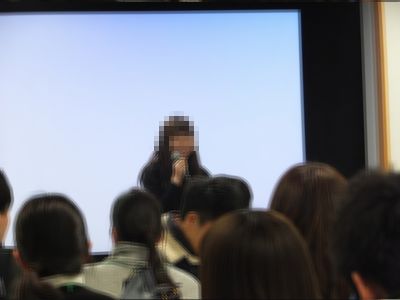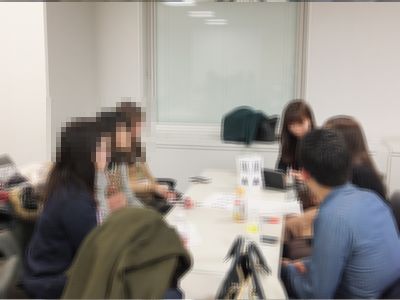1.受付の様子

2.マテリアルの紹介 Sさん

3.会場の様子

:::::::::::::::::::::::::::::::::::::::::::::::::::::::::::::::::::::::::::::::
《 今回のworkshop 》
○workshop参加人数:66名(うち新人の方:5名)
○【前半】:Premium Friday
○【後半】:Basic income
:::::::::::::::::::::::::::::::::::::::::::::::::::::::::::::::::::::::::::::::::
みなさま明けましておめでとうございます。E’s club幹事のKです。
本年もE’s clubをよろしくお願いいたします。
2017年の初回となる1月14日(土)開催の第142回workshopの詳細をお送りいたします。
今回は前半のマテリアルをSさん、後半のマテリアルをMさんにご作成いただきました。
前半は”Premium Friday”、後半は”Basic income”というタイトルでそれぞれディスカッションを行います。
[今週のマテリアル]
≪FIRST HALF≫
**Agenda**
Premium Friday
**Reference**
Premium Friday campaign to encourage workers to leave early
The Ministry of Economy, Trade, and Industry and 15 business groups will launch a new campaign called Premium Friday, in February, in which workers will be encouraged to leave at 3 p.m. on the last Friday of each month. The government hopes the initiative will encourage workers to enjoy activities such as shopping, dining and traveling, and thus give the economy a boost.
According to the government, the campaign launch date for the first Premium Friday will be Feb 24, 2017, Fuji TV reported. The initiative is being supported by Keidanren (Japan Business Federation), department and chain stores associations.
However, government officials and businesses said there are many unknown factors, so the campaign will first be launched as a trial in the Nihonbashi and Marunouchi districts of Tokyo, and then in other parts of Tokyo and Japan later on.
Some issues yet to be resolved are how to encourage employees to leave their offices so early, how to avoid retailers from getting involved in price wars by offering excessive discounts and what services can be set up to cater to employees who want to enjoy themselves once they finish work at 3 p.m.
(Sited from JAPAN TODAY
https://www.japantoday.com/category/business/view/premium-friday-campaign-to-encourage-workers-to-leave-early)
**Questions**
1, Do you think your office can accept this campaign, which means to leave your office at 3pm on the last Friday of each month?
2, What is unknown factors which should be resolved to launch Premium Friday at your office?
3, Do you think that this campaign will boost people’s consumption?
4, What kind of activities do you choose if you could leave your office at 3pm on Friday?
If your group has more time, please refer to the list below.
It is a relative fact that Japan has most national holidays in number around the world. Here is the list of national holidays in 2017. There are 17 national holidays in total.
Why do you think Japanese government has enacted so many national holidays as compared to other countries?
2017
Jan 2- New Year’s Day
Jan 9- Coming of Age Day
Feb 3- Beginning of Spring
Feb 11- National Foundation Day
Mar 3- Girls’ or Dolls’ Festival
Mar 20- Spring Equinox
Apr 29- Showa Day
May 3- Constitution Day
May 4- Greenery Day
May 5- Childrens’ Day
Jul 17- Marine Day
Aug 11- Mountain Day
Aug 13-15- Obon (Although this is a traditional festival and not an official national holiday, many offices are closed)
Sep 18- Respect for the Aged Day
Sep 23- Autumn Equinox
Oct 9- Sports Day
Nov 3- Culture Day
Nov 23- Labour Thanksgiving Day
Dec 23- Emperor’s Birthday
Dec 31- New Year’s Eve
≪LATTER HALF≫
<Agenda>
Basic income
The highly automated machines will take over most of our work and provide us with so many opportunities that we can go forward in the future. Probably the nature of work will be different, the amount of work will change. In Europe, the concept of basic income has been discussed to adapt for that change. Let’s have a look at the idea of the basic income, and discuss the questions below.
<Questions>
1. Have you ever worked for free or participated in voluntary work?
2. What would you do if your income were taken care of?
3. What are merits and demerits of the concept of basic income?
4. What do you think about concerns that people wouldn’t have any incentive to go to work if we introduce the basic income?
5. Do you think disconnecting the link between work and money would be bad for society?
<Reference>
http://www.latimes.com/world/europe/la-fg-germany-basic-income-20151227-story.html
http://www.bbc.com/news/world-europe-36454060
Would Germany be a better place if each citizen received a no-strings-attached government check for $1,100 a month?
Would people still get out of bed each day and go to work or do something else productive even with that unconditional basic income of 1,000 euros, less than half the average German monthly wage, but more than twice what those on welfare receive?
Those are among the questions being examined in a small real-life experiment called “Mein Grundeinkommen” (My Basic Income) taking place in Germany – where 26 people thus far are being given $1,100 a month to do whatever they want with.
The privately operated project, financed by crowdfunding donations, has injected new life into an old debate in Germany about utopian ideals. The idea of a “basic wage” is also touching a nerve in Germany and across Europe amid a rise in poverty and an increase in the number of working poor.
The notion of the state giving everyone an “emancipatory basic income,” as it also is sometimes called, is cherished not only by leftists in Germany but has also been supported by some on the right side of the political spectrum. Detractors, however, express fears that it would take away the incentive for people to work, while costing the government a fortune.
In Finland, a new conservative-led government announced plans this month to hand out a universal basic income of nearly $900 per month starting in 2017. The basic income payments would replace all other benefits, cutting administration and means-testing costs, and will be paid to everyone regardless of whether they have other sources of income. Opinion polls show 70% of Finns favor the idea, which will cost more than $50 billion a year. A referendum on the same question is due in Switzerland in February. There is growing support for a basic income in the Netherlands.
The universal basic income has long had many supporters in Germany. The state already pays a sort of “mini basic income” of about $200 per month for all children and young adults up to the age of 25 as long as they are in school or at college, which are also free of charge. But it was never tested in a real-life situation in Germany until Berlin entrepreneur Michael Bohmeyer, 31, decided to launch his “My Basic Income” project in 2014.
“A basic income paid out to everyone could unleash enormous amounts of creativity,” said Bohmeyer, who left his Internet start-up business, and for a while was savoring a relatively carefree life, living off those proceeds, when he came up with the basic payment experiment.
“Machines are going to be taking care of just about everything for us over time,” added Bohmeyer, who comes from formerly communist eastern Germany. “So to be able to work creatively, people need some security, they need to feel free. And they can get that with a basic income.”
At this point, 26 people have been chosen at random to get a taste of basic income. Every few weeks, several more people are selected through drawings to receive 1,000 euros per month each for a year. They’re free to do whatever they want with the money. The recipients are picked from a pool of more than 66,000 applicants and drawings are held whenever enough donations are collected. So far a total of 31,449 people have made donations.
“The most popular donation is 33 euros,” Bohmeyer says. “That’s equal to the daily amount needed to finance a basic income of 1,000 euros per month.”
At the last lottery on Dec. 8, held in front of a small but spirited audience at the Maxim Gorki Theater in Berlin and streamed on the Internet (1,100 people watched), five winners were selected: a woman who said she wanted to use the income to “spend more time with her children and do volunteer work”; another woman who said she wanted “to be able to live my dreams and give something back”; a third woman who said she wanted “to develop a theater production”; a man who said he would use the money “to hire a new employee to help my ecological vegetable garden business grow”; and a fourth woman who wrote she “wants to wake up happy every day, to travel more and support other artists.”
“It’s really cool that we were able to raise enough donations within less than a month for five more people to get the basic income for a year,” Bohmeyer said just before the drawing, which used a lottery wheel. “And that came mostly from small donations.”
Most people who win haven’t quit their jobs, he said. But there is nevertheless often a significant change in their outlook on life, he added.
“The one thing that everyone tells us is that they’re able to sleep much better,” Bohmeyer said. “But, ostensibly, not a lot changes: The students keep studying, the workers keep working and the pensioners are still pensioners. But there is a big change that takes place in their minds. People feel liberated and they feel healthier.”
One winner opted to spend his first month’s payment partying with his friends, Bohmeyer said. “He just felt an urge to do that,” he said. “He needed to get that out of his system.”
Bohmeyer said another winner, unable to work because of chronic ailments, wound up with less stress and fear than when he had to miss work.
“For the last nine months he hasn’t had any more episodes,” said Bohmeyer. “For a meager 1,000 euros per month, a human being has got his health back. Is that unreal, or what?”
One recipient did quit a job he that he said he hated: at a call center. But the young man from the western city of Muenster didn’t just lounge around on the couch watching TV all day; instead he used the money to go back to school and is studying to become a kindergarten teacher. He has managed to make ends meet after the year was over with other odd jobs and is grateful for the help he got to change his life, Bohmeyer said.
The idea of a basic income has four core elements: it’s universal, it’s individual, it’s unconditional, and it’s at a level that is high enough for a decent standard of living.
The project has caught the eye of German politicians like Katja Kipping, the co-leader of the hard left party Die Linke. She has long advocated a universal basic income. The Left Party discussed the issue intensively at its last congress in Bielefeld, although many party members were skeptical.
“It’s a good idea that is taking the discussion on basic income forward,” Kipping said after a visit to Bohmeyer’s offices.
She believes that a universal basic income in Germany could succeed because many people now work without remuneration and with too little recognition – caring for family members, housekeeping, volunteer work and coaching at clubs. “There is more work being done without pay than there is at the factories and office buildings and everywhere else.”
Economists are, not surprisingly, divided on the issue, with some labeling it “nonsense.” Political analysts don’t expect it to be introduced in Germany any time soon.
“The idea hasn’t even found a consensus in any of the parties,” said Carsten Koschmieder, at Berlin’s Free University. “There are just too many concerns in all the parties that people wouldn’t have any incentive to go to work and too many unanswered questions about who would pay for it all.”
***********************************************************
私たちと一緒に英語コミュニケーション能力を鍛えませんか?
ご興味を持たれた方は、
入会申込フォーム
https://english-speaking-club.com/cms/?page_id=93
よりお申し込みください。お待ちしています!
***********************************************************